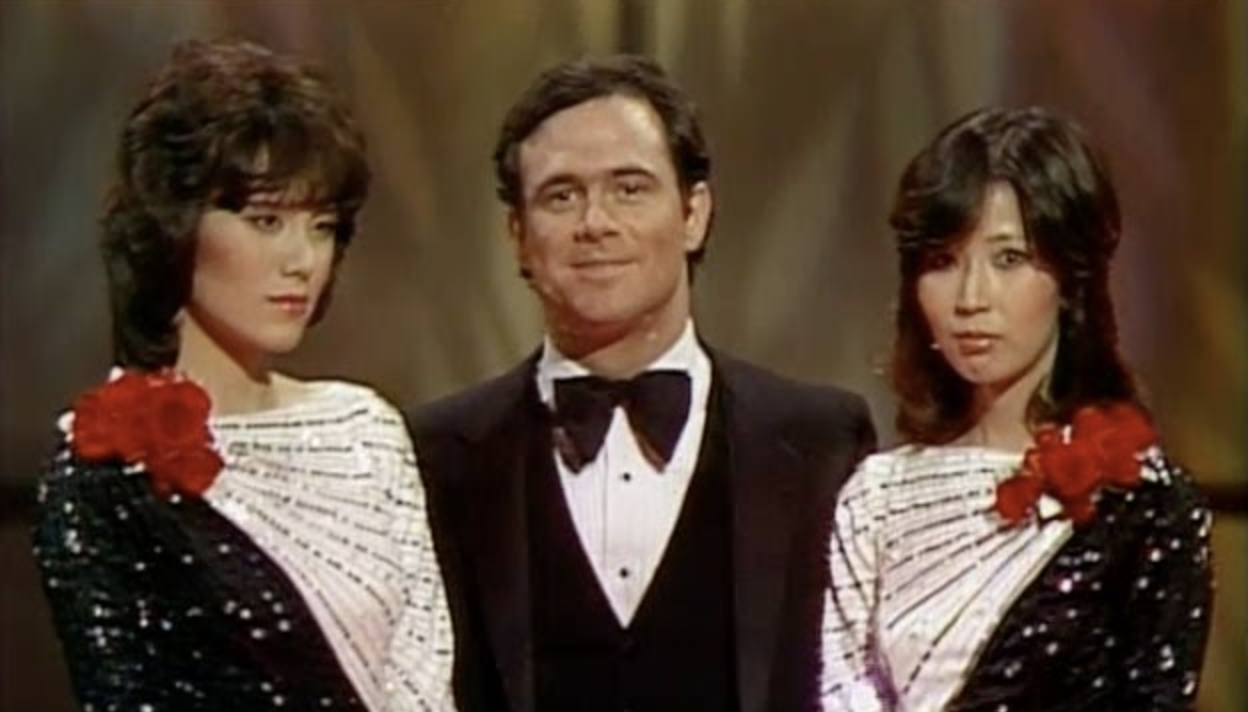In 1963, Kyu Sakamoto’s “Sukiyaki” proved that a song sung in Japanese could top the charts in the United States. Not that the American recording industry was quick to internalize it: another Japanese single wouldn’t break the Billboard Top 40 for sixteen years, and even then it did so in English. The song was “Kiss in the Dark” by Pink Lady, a pop duo consisting of Mitsuyo Nemoto and Keiko Masuda, better known as Mie and Kei. In 1978 they’d been the biggest pop-cultural phenomenon in their native country, but the following year their star had begun unmistakably to fall. And so, like many passé Western acts who become “big in Japan,” Pink Lady attempted to cross the Pacific.
Mie and Kei made their American television debut performing “Kiss in the Dark” on Leif Garrett’s CBS special in May 1979. Accounts differ about what happened next, but less than a year later they had their own primetime variety show on NBC. Officially titled Pink Lady, it tends to be referred to these four decades later as Pink Lady and Jeff. This owes to the role of its host, rising (and NBC-contracted) young comedian Jeff Altman, who brought to the table not just his comic timing and skill with impressions, but also his command of the English language. That last happened not to be possessed to any significant degree by Mie or Kei, who had to deliver both their songs and their jokes phonetically.
In the video at the top of the post, you can see a compilation of the highlights of Pink Lady and Jeff‘s entire run. Then again, “highlights” may not be quite the word for a TV show now remembered as one of the worst ever aired. “Pink Lady and Jeff represents an unpalatable combination of institutions that were on their way out, like variety shows, disco, and the television empire of creators and puppeteers Sid and Marty Krofft,” writes the AV Club’s Nathan Rabin. The Krofft brothers, creators of H.R. Pufnstuf and Land of the Lost, tell of having been tapped to develop a program around Mie and Kei by NBC president Fred Silverman, who’d happened to see footage of one of their stadium-filling Tokyo concerts on the news.
Sid Krofft remembers declaring his ambition to make Pink Lady “the strangest thing that’s ever been on television.” The startled Silverman’s response: “Let’s do Donny and Marie.” Donny Osmond himself ended up being one of the show’s high-profile guest stars, a lineup that also included Blondie, Alice Cooper, Sid Caesar, Teddy Pendergrass, Roy Orbison, Jerry Lewis, and even Larry Hagman just a week before the epochal shooting of his character on Dallas. None of them helped Pink Lady find enough of an audience to survive beyond its initial six episodes (all available to watch on Youtube), a discomfiting mélange of generic comedy sketches, unsuitable musical performances (with precious few exceptions, Mie and Kei weren’t permitted to sing their own Japanese songs), and broad references to sushi, samurai, and sumo.
The main problem, Altman said in a more recent interview, “the variety show had run the gauntlet already, and really was not a format that was going to live in the hearts and homes of people across America anymore.” Not only had that long and earnest television tradition come to its ignominious end, it would soon be replaced by the ironic, ultra-satirical sensibility of Altman’s colleague in comedy David Letterman. But here in the twenty-first century, Altman guesses, the time may be ripe “for a variety-type show to come back.” We live in an era, after all, when a piece of forgotten eighties Japanese pop can become a global phenomenon. And however dim the prospects of the variety show as a form, Mie and Kie themselves have since managed more comebacks than all but their most die-hard fans can count.
Related content:
David Bowie and Cher Sing Duet of “Young Americans” and Other Songs on 1975 Variety Show
Famed Art Critic Robert Hughes Hosts the Premiere of 20/20, Where Tabloid TV News Began (1978)
Based in Seoul, Colin Marshall writes and broadcasts on cities, language, and culture. His projects include the Substack newsletter Books on Cities, the book The Stateless City: a Walk through 21st-Century Los Angeles and the video series The City in Cinema. Follow him on Twitter at @colinmarshall, on Facebook, or on Instagram.
